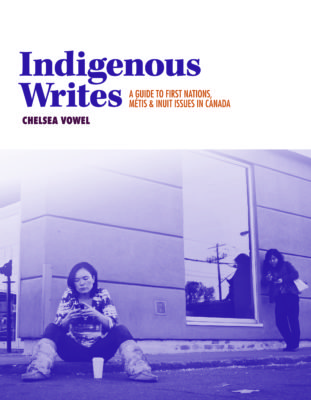Considering the complexities and difficulties surrounding questions of Indigeneity and non-Indigeneity in Canada, few would have the expertise and courage required to write “A Guide to First Nations, Métis & Inuit Issues.” But this is exactly what Métis author and educator Chelsea Vowel has done. With a law degree, an influential blog (apihtawikosisan.com), experience teaching the Cree language, and frequent op-eds in national media, she is uniquely situated and qualified for the task. Her first book, Indigenous Writes, is a must-read for anyone who wants to understand the history and present of Indigenous-Canadian relations.
I teach a large course at the University of Ottawa introducing students to Indigenous studies and expend much energy in the course asking students to carefully examine their own place in the history and future of Canadian-Indigenous relations. Indigenous Writes perfectly complements this approach with a conversational style that invites the reader to rethink what they think they already know. Vowel begins the book with two chapters on the “Terminology of Relationships,” in which she addresses questions of vocabulary such as Indigenous versus Aboriginal, as well as different words used to describe non-Indigenous peoples. Students are often anxious about using the right words, and by starting the book in this way Vowel opens up the conversation and invites readers to participate. The subsequent chapters summarize current issues and histories of First Nations, Inuit, and Métis peoples, and dive into hot topics including cultural appropriation, blood-quantum reasoning, authenticity, and two-spirit identities.

Indigenous Writes
A Guide to First Nations, Métis & Inuit Issues in Canada
Chelsea Vowel
Highwater Press
$26.00
paper
240pp
9781553796800
Many of my students, expecting a dry textbook, were pleasantly surprised by Vowel’s conversational style. With chapter subheadings like “Confused yet?” and transition sentences like “Now wait a minute, isn’t jigging an Irish thing?” Vowel succeeds in distilling extremely complex subject matter into dense chapters of just a few pages each, while still throwing in jokes and keeping it real.
Indigenous Writes is a timely book – it appears at a moment when many Canadians are hungry to learn more about Indigenous peoples and colonialism in Canada. Each of Vowel’s short chapters can be read in a few minutes, and each one contains enough critical information to challenge harmful assumptions and facilitate understanding. This is
a book for everyone – but particularly for non-Indigenous people wishing to better understand their own place in the history of violence against Indigenous peoples, and to find ways to move toward true solutions and right relationships. mRb






0 Comments